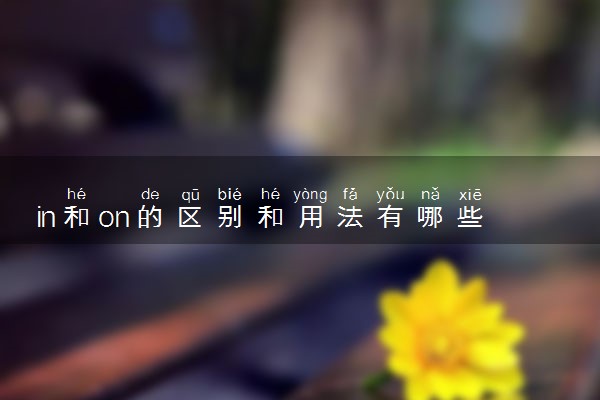专为高中生提供有价值的资讯
介词in和on用法区别:in表示在……中,在……内,例如:in the village(在村里)in the street(在街上)in the fields(在田里)in the woods(在树林里)。

in
小小介词in,用途却很多.可表时间,表地点,表手段、方法、材料.
(1)in表示时间,用于泛指一天的上午、下午、晚上等;用于某个较长的时间,如年、月、季节等.如:
in the morning/afternoon/evening在上(下午)或晚上,in 2003在2003年,in the day/daytime在白天
in还可以表示“从现在起一段时间以后”.如:
They will see you in a week.他们将在一周后去看你.
另外,in和at都可以表示时间,但in表示较长的时间,而at表示时间的某一点.例如:
He got up late in the morning and had a meal at noon.他早上起得晚,所以只吃午餐.
(2)in表示地点、场所,译为“在.里”、“在.中”.如:in the factory 在工厂,in the room 在房间里,in the sun 在阳光下,in the middle of...在.的中央
in和at都可表示地点,而in表示的地点比at所表示的地点大.
(3)in表示用语言,用.材料.译为“用.,以.方式”.如:in English用英语,in ink用墨水
(4)in表示穿戴的状态,译为“戴着、穿着”.如:in the white shirt穿着白色的衬衫,in the cap戴着帽子
on
介词on表示时间、地点、方位等.
(1)on表示时间,用于星期、日期(包括该天的各部分).如:on Sunday/Sundays,on Monday morning/afternoon/evening等.
on也用于某一日的名词前,用于公共节假日前.如:
On New Year's Day 在元旦,on Children's Day 在儿童节等.
(2)on表示地点、位置,有“在.旁”、“接近”、“靠近”之意.如:
a house on the main road 临大街的房子,sit on my right 坐在我的右边
(3)on表示状态,译为“处于.情况中,从事于.”等.如:
on duty 值日,on holiday 度假
(4)on表示“在.上面”,用在表示物体的名词前.如:
“in”是一个介词,在句子中用来表示在一个封闭的地方(即有物理或虚拟边界的空间)或被其他东西包围的东西。我们将通过以下几点了解“in”的用法:
1. 当某物在物体或地方内或被某物包围时:
Maaya is sitting in the park.(玛亚坐在公园里。)
What was there in your pocket?(你口袋里有什么?)
2.它可以用来表示进入某事:
Don’t put all your eggs in one basket.(不要把所有的鸡蛋放在一个篮子里。)
3.它表示较大组的一部分或其他内容:
Shahrukh Khan played a lead role in ‘Raees’.(Shahrukh Khan在《Raies》中扮演了主角。)
He has been working in this company for ages.(他在这家公司工作多年了。)
4.它用来表示时间段:
The movie was released in 1994.(这部电影于1994年上映。)
This is the first time I am going to London, in 10 years.(这是我十年来第一次去伦敦。)
5.它可以与一天中的部分时间一起使用:
I will meet you in the morning.(我将在早上与你相见。)
There is one exception to this rule, and that we use at night, and not in the night.(这个规则有一个例外,我们在晚上使用,而不是在晚上。)
6.也用于表示不超过规定时间:
The counsellor will arrive, in a couple of hours.(辅导员几个小时后就到。)
Can you submit the project in two days?(你能在两天内提交这个项目吗?)
7.要表达一种体验:
I fell in love with Priyanka Chopra.(我爱上了普里扬卡·乔普拉。)
She was in hurry, as she had an interview today.(她赶时间,因为她今天有个面试。)
8.表达某件事是由其他事件引起的:
She offered me chocolates in return for my gift.(她给我巧克力作为礼物的回报。)
“on”这个词指的是某种东西与其他东西物理接触,或得到某种东西支持的情况。 让我们一起看看在句子中何时使用on:
1.表示某物是置于某物之上并与之接触的:
Your document folder is on the top of the almirah.(您的文档文件夹在衣橱的顶部。)
I saw a beggar yesterday, standing on the roadside.(昨天我看见一个乞丐站在路边。)
2.表示与某事物的连接:
There is a big painting on the wall.(墙上有一幅大画。)
3.表示时间,即某天、日期和特殊天数:
The birthday party will be held on Sunday.(生日聚会将在星期天举行。)
My son’s birthday is on 14th Feb.(我儿子的生日是2月14日。)
4.表示一个过程:
She is on her way to Paris.(她正在去巴黎的路上。)
Pihu is on leave this month, due to her brother’s marriage.(因为她哥哥的婚姻,庇虎这个月休假。)
5.当与某物有关时:
Kriti wrote a novel on dreams and passion.(克里蒂写了一部关于梦和激情的小说。)
Do you think, your speech has any effect on them?(你认为你的演讲对他们有什么影响吗?)
6.当我们谈论一天中的一部分时:
We left for the picnic, on Sunday morning.(我们星期天早上出发去野餐。)
Copyright 2019-2029 http://www.laigaokao.com 【来高考】 皖ICP备19022700号-4
声明: 本站 所有软件和文章来自互联网 如有异议 请与本站联系 本站为非赢利性网站 不接受任何赞助和广告